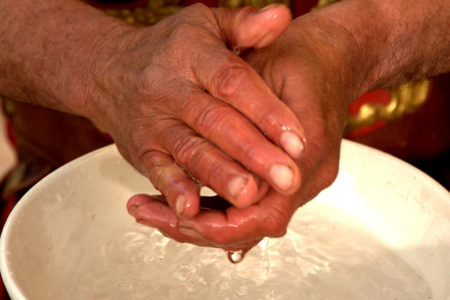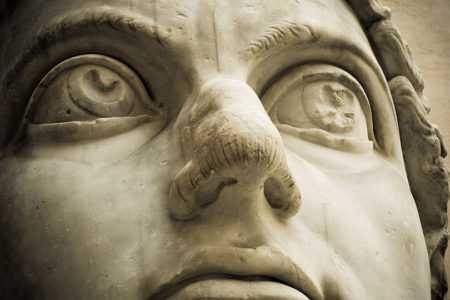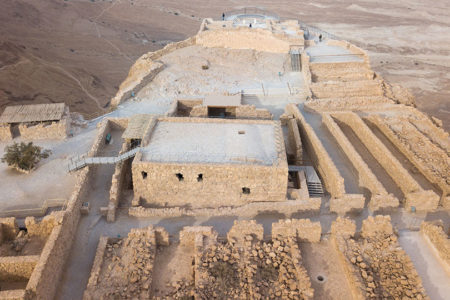Who Killed Christ?
Possibly no subject in history has been as inflammatory to the Jewish people as the question, Who killed Christ? Time and again, the accusation of Christ-killer has been hurled against the Jewish people. Centuries of hatred have been built on the theme that the Jewish people are responsible for the death of Jesus.
Such reckless and irresponsible rhetoric, of course, flies in the face of any rational, biblical analysis. It has, nonetheless, been espoused by some theologians with less than charitable feelings for the Jewish people. The Apostle Paul focused on just how God feels about these people in a very few words: “Hath God cast away his people? God forbid” (Rom. 11:1). Again he says, “they are beloved for the fathers’ sakes. For the gifts and calling of God are without repentance” (Rom. 11:28–29). Problems arose when a cadre of theologians made a sharp turn away from the biblical mandate to comfort God’s people, Israel (see Isa. 40:1). To this day, many nominal Christians have been deluded into thinking of the Jews as collective “Christ-killers.”
Are the Jewish people responsible for the death of Christ? Are they as guilty as some have charged? Is there any basis to this charge? Or is there a more balanced biblical view of this issue?
Accusations!
Early in the second century A.D., the professing Christian church left its roots of philo-Semitism (love of the Jews) and began to propagate anti-Semitism (hatred of the Jews).
The writings of the early church fathers showed a consistent prejudice against the Jewish people. Melito of Sardis (120–185 A.D.) was one of the first to accuse the Jewish people of murdering God when he wrote, “God has been murdered, the King of Israel slain by an Israelite hand.” Around 200 A.D., Hippolytus of Rome wrote, “Hear my words, and give heed thou Jew. Many a time does thou boast thyself that thou didst condemn Jesus of Nazareth to death.…Of what retribution does Jesus speak? Manifestly of the misery which has now got hold of thee.” Justin Martyr (110–165 A.D.) wrote, “Tribulations were justly imposed on you for you have murdered the Just One.”
These teachings led to the charge of deicide against the Jewish people—that is, the Jews who killed Jesus killed God. In his book, A Legacy of Hatred: Why Christians Must Not Forget the Holocaust, David Rausch says, “The ‘Christ-killer’ theme permeated church history—wreaking havoc on the Jewish community.”
In no small measure, this developing hatred and its existence today can be attributed to the allegorizing of Scripture. Origen (184–254 A.D.) was one of the main proponents of this understanding of Scripture, which teaches that the church has forever replaced Israel in God’s plan. Origen and this doctrine had a profound influence on the developing hatred of Jewish people within Christendom.
N. R. M. deLange, in Origen and the Jews, Studies in Jewish Christian Relationships, says, “He [Origen] lost no opportunity in his sermons to attack Jewish literalism, and his powerful invective no doubt made its contribution to the later tragic persecution of Jews by Christians” (Stan Telchin, Abandoned, p. 57). Origen taught that the responsible party for Jesus’ death was not Pontius Pilate, but the Jewish people.
Stan Telchin’s comments on this are helpful. “Origen’s teaching that the Jews were unrepentant Christ-killers who had been replaced in the heart of God produced greater and greater hatred for them. It spread from theologian to theologian, from teacher to teacher, from pastor to pastor, from church member to church member, from pagan to pagan” (Ibid., p. 58).
In the diatribes of many Passion Week sermons, the Jewish people are usually presented as the villains of the unfolding events. The famous Passion Play in Oberammergau, Germany (first presented in 1634 and now produced every year ending in zero), is a classic illustration. In manner and in speech, Jewish people are depicted in this play as greedy, traitorous villains. It is not surprising that the Anti-Defamation League has been working with the producers of the 2000 play to change the script and characters and remove the anti-Semitic overtones. Pulpit sermons around Passion Week are not much better than the view this play has presented of the Jewish people.
How unfortunate and unbiblical this emphasis has been. An unbiased look at the Word of God presents a different, balanced understanding of who killed Christ.
The Romans
Roman culpability in the death of Christ must rank high in any understanding of responsibility. The Romans were the reigning authority during that time, and, every step of the way, the Roman authorities were directly involved in the events that culminated in Jesus’ death.
The Roman authorities had the final say in every aspect of the events leading up to the crucifixion. It was Roman soldiers who came with Judas to arrest Jesus in the Garden of Gethsemane. The word band in John 18:3 is the Greek word speira and denotes a Roman cohort under the command of a tribune and numbering 600 infantry (Vine’s Complete Expository Dictionary of Old and New Testament Words, p. 49, no. 1). Most likely Pontius Pilate had assigned the Roman soldiers to the chief priests for the purpose of arresting Jesus. This is probably alluded to in Matthew 27:65, when Pilate told the chief priests and the Pharisees that they already had a Roman guard for the tomb of Jesus.
Jesus was brought before Pontius Pilate, the procurator or governor of Judea, to be condemned to die because the Jewish authorities did not have the power of capital punishment. Initially Pilate told them, “Take ye him, and judge him according to your law,” but “The Jews, therefore, said unto him, It is not lawful for us to put any man to death” (Jn. 18:31). Three times Pilate argued for the innocence of Jesus. He well knew that Jesus had committed no crime worthy of incrimination, let alone the death penalty. However, Pilate ultimately agreed to Jesus’ crucifixion. There is no excuse for his action. He had sole discretion in the matter, and regardless of the pressure, it was this Roman governor who passed the death sentence.
Another Roman authority was also instrumental in this miscarriage of justice. Pilate sent Jesus to Herod Antipas, who was in Jerusalem at the time. Being from Galilee, Jesus was under Herod’s jurisdiction. Herod could have set Jesus free, but he washed his hands of the matter and sent Him back to Pilate.
Finally, it was Roman soldiers who marched Jesus to the hill of Calvary. There they nailed Him to a cross and lifted Him up, in fulfillment of the death penalty handed down by their Roman leaders. Roman complicity in the death of Jesus was present from beginning to end. They alone wielded the power of death at that time, and they carried it out.
The Jewish People
There was also Jewish culpability in the events leading up to Jesus’ death. Unfortunately, the emphasis is usually placed on the Jewish people as a whole, rather than on the small number of Jews who were actually involved. The Passion Week events seem to focus on a few Jewish people carrying out the events, led by some—but not all—of the leaders of Israel. The phrase the Jews used in the Gospel accounts is not a condemnation of the entire nation but, contextually, of a small group of Jewish people.
The historical misinterpretation of Matthew 27:25 has been a blot on the church and a curse to the Jewish people. Only a very biased, shallow understanding of this verse could blame the entire Jewish nation. The crowd’s declaration, “His blood be on us, and on our children,” can be attributed only to this small group of Jewish people.
Michael Rydelnik is correct when he writes, “The crowd that gathered before the Praetorium,…does not represent the entire nation. This group was gathered by the chief priests to support their own desire for Jesus’ crucifixion. The crowd’s guilt, however, is not automatically transferred to the whole nation” (His Blood Be Upon Us, Mishkan, issue 6&7). This verse is not anti-Semitic, but its misuse has resulted in anti-Semitism by many in Christendom.
The claim of collective responsibility of all Jewish people for the death of Christ has no basis in a fair, balanced understanding of the Word of God. It is patently absurd to make this claim in light of the fact that the apostles, the first disciples, and the early church were almost totally comprised of Jewish people.
The Christ-killer charge against the Jewish people is biblically unsubstantiated. Preachers must begin to present a balanced view of the Gospel narratives when they address this subject.
The Ultimate Guilt
Two other aspects of the question Who Killed Christ? must be addressed. First, there is collective guilt for the death of Christ. The real reason for Jesus’ coming to earth was the sin of the world. “For all have sinned, and come short of the glory of God” (Rom. 3:23). This includes Jews and Gentiles alike. Jesus died and rose from the grave that our sins might be forgiven.
Second, Jesus willingly gave up His life for both Jews and Gentiles. No individual or group forced Him to die. Speaking of His life, Jesus said, “No man taketh it from me, but I lay it down of myself. I have power to lay it down, and I have power to take it again” (Jn. 10:18).
Yes, the sins of both Jews and Gentiles brought about the death of Jesus. But, His death was the greatest outpouring of love the world will ever see—the life of the Son of God willingly sacrificed so that we might live with God eternally.







